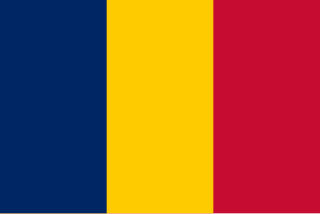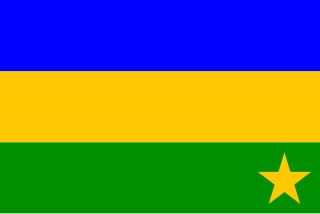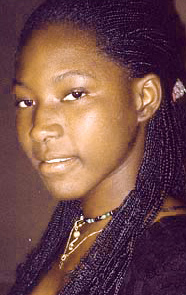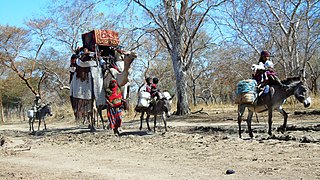Related Research Articles

The people of Chad speak more than 100 different languages and divide themselves into many ethnic groups. However, language and ethnicity are not the same. Moreover, neither element can be tied to a particular physical type.

Chad, officially the Republic of Chad, is a landlocked country at the crossroads of North and Central Africa. It is bordered by Libya to the north, Sudan to the east, the Central African Republic to the south, Cameroon to the southwest, Nigeria to the southwest, and Niger to the west. Chad has a population of 16 million, of which 1.6 million live in the capital and largest city of N'Djamena.

Demographics of Libya is the demography of Libya, specifically covering population density, ethnicity, education level, health of the populace, economic status, and religious affiliations, as well as other aspects of the Libyan population. The Libyan population resides in the country of Libya, a territory located on the Mediterranean coast of North Africa, to the west of and adjacent to Egypt. Libyans live in Tripoli. It is the capital of the country and first in terms of urban population, as well as Benghazi, Libya's second largest city.

The demographics of Sudan include the Sudanese people and their characteristics, Sudan, including population density, ethnicity, education level, health, economic status, religious affiliations, and other aspects of the population.

The Kanuri people are an African ethnic group living largely in the lands of the former Kanem and Bornu Empires in Niger, Nigeria, Sudan, Libya and Cameroon. Those generally termed Kanuri include several subgroups and dialect groups, some of whom identify as distinct from the Kanuri. Most trace their origins to ruling lineages of the medieval Kanem-Bornu Empire, and its client states or provinces. In contrast to the neighboring Toubou or Zaghawa pastoralists, Kanuri groups have traditionally been sedentary, engaging in farming, fishing the Chad Basin, trade, and salt processing.
A multinational state or a multinational union is a sovereign entity that comprises two or more nations or states. This contrasts with a nation state, where a single nation accounts for the bulk of the population. Depending on the definition of "nation", a multinational state is usually multicultural or multilingual, and is geographically composed of more than one country, such as the countries of the United Kingdom.

The Sara people are a Central Sudanic ethnic group native to southern Chad, the northwestern areas of the Central African Republic, and the southern border of North Sudan. They speak the Sara languages which are a part of the Central Sudanic language family. They are also the largest ethnic group in Chad.
The Sara languages comprise over a dozen Bongo–Bagirmi languages spoken mainly in Chad; a few are also spoken in the north of the Central African Republic. They are members of the Central Sudanic language family. Greenberg (1966) treats all varieties as dialects of a Sara language, whereas Tucker and Bryan (1966) consider the Sara to be a dialect cluster of several languages. Most members of the different Sara languages/dialects consider their speech form distinct languages, but there is currently insufficient language information to determine which speech varieties need to be considered distinct languages, and which are dialects of other languages.

Chad has two official languages, Arabic and French, and over 120 indigenous languages. A vernacular version of Arabic, Chadian Arabic, is a lingua franca and the language of commerce, spoken by 40–60% of the population. The two official languages have fewer speakers than Chadian Arabic. Standard Arabic is spoken by around 615,000 speakers. French is widely spoken in the main cities such as N'Djamena and by most men in the south of the country. Most schooling is in French. The language with the most first-language speakers is probably Ngambay, with around one million speakers.
The Buduma are an ethnic group of Chad, Cameroon, and Nigeria who inhabit many of the islands of Lake Chad. They are predominantly fishers and cattle-herders. In the past, the Buduma carried out violent raids on the cattle herds of their neighbors. They were feared villains with aggressive reputations; thus, they were respected and left alone for many years, protected by their own habitat of water and reeds.
The Maba or Bargo people are a Sunni Muslim ethnic group found primarily in the mountains of Wadai region in eastern Chad and western Sudan. Their population is estimated to be about 300,000 in Chad. Other estimates place the total number of Bargo people in Sudan to be about 700,000.
Sara may refer to:
Ngambay is one of the major languages spoken by Sara people in southwestern Chad, northeastern Cameroon and eastern Nigeria, with about a million native speakers. Ngambay is the most widely spoken of the Sara languages, and is used as a trade language between speakers of other dialects. It is spoken by the Sara Gambai people.

The population of Chad has numerous ethnic groups. SIL Ethnologue reports more than 130 distinct languages spoken in Chad.
Doba is a Central Sudanic language of Chad. It is traditionally considered three languages, because it is spoken by three ethnicities with separate identities, the Bedjond, the Mango, and the Gor. However, all have a high degree of mutual intelligibility, and so by that standard are a single language.

Pakistanis are the citizens and nationals of the Islamic Republic of Pakistan. According to the 2017 Pakistani census, the population of Pakistan stood at over 213 million people, making it the world's fifth-most populous country. The majority of Pakistanis natively speak languages belonging to the Indo-Iranic family.

Bangladeshis are the citizens of Bangladesh, a South Asian country centred on the transnational historical region of Bengal along the eponymous bay.
Saya is a Chadic dialect cluster of Nigeria.

Malaysians are citizens who are identified with the country of Malaysia. Although citizens make up the majority of Malaysians, non-citizen residents and overseas Malaysians may also claim a Malaysian identity.
References
- ↑ "Sara".
- ↑ "Sara".
- ↑ "Largest Ethnic Groups of Chad". 25 April 2017.
- ↑ "Sara".
- ↑ "Largest Ethnic Groups of Chad". 25 April 2017.
- ↑ "Largest Ethnic Groups of Chad". 25 April 2017.
- ↑ "Largest Ethnic Groups of Chad". 25 April 2017.